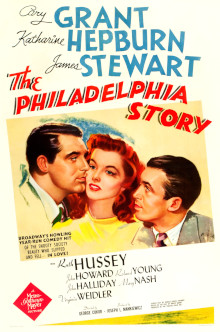- Franz Waxman
The Philadelphia Story: Suite (for orchestra) (1939)
- G Schirmer under license to Fidelio Music from EMI Music (World)
restored by Charles Gerhardt
- 3(III:pic).2+ca.2+bcl.2.asx/4.3.3.1/timp.2perc/pf.hp/recording/str
- 3 min 34 s
Programme Note

Sections
Metro-Goldwyn-Mayer Fanfare (featuring Leo the Lion)
Main Title
The True Love
Note
“The prettiest sight in this fine, pretty world is the privileged class enjoying its privileges.”
How much more sophisticated, intelligent and romantic, can a movie be, than The Philadelphia Story (1940)? Granted, its origins were a play by Philip Barry, who wrote the Tracy Lord character with Katherine Hepburn in mind. She starred in it on Broadway, playing opposite Joseph Cotton and Van Heflin. It ran for over 400 performances and through a subsequent nationwide tour. It was actually Hepburn’s revenge. She had been dubbed movie box-office poison two years earlier, and now, as a smash on Broadway, she sought resurrection in the film industry.
When Hollywood came a-calling, the studios were surprised to learn that they had to deal with Hepburn, who owned the rights to the play. Warner Brothers offered $225,000, but they didn’t want Hepburn. Eventually, MGM made the deal. $175,000 for the rights, Kate included for an additional $75,000. Hepburn would also get her choice of director and co-stars. The Metro stable was full of choices. Clark Gable, Spencer Tracy? However, they were busy with another film. (It was Boom Town [1940], scored by Franz Waxman!) With Hepburn’s okay, it would be Cary Grant and James Stewart. (Grant would get top billing and donate his $137,000 salary to the British War Relief Fund.) Along with Ruth Hussey, John Howard and others, it’s a dream cast. After all, wasn’t this the studio that had ‘more stars than there are in heaven’?
Hepburn also okayed George Cukor as director. Known as a ‘woman’s director’. By that time, Cukor and Hepburn had made four films together: A Bill of Divorcement (1932), Little Women (1933), Sylvia Scarlett (1935) and Holiday (1938), the latter two, co-starring Grant.
Waxman’s music for The Philadelphia Story, beginning with his fanfare over the growling MGM lion, and the subsequent score just oozes sophistication. One should be seated, dressed in a tux or ball gown, holding a martini, to watch this movie. The opening scene has no dialogue, just Waxman’s staccato scoring, which mimics the action as Hepburn kicks Grant out of the house, breaks his golf club, and he follows her back to the door, threatening a punch but pushing her to the floor instead. Within these few moments, we know the relationship of the two main characters and that this is going to be a good time for all. (Waxman’s other professional encounters with Cary Grant was for Suspicion (1941) and five years later when he scored Destination Tokyo (1943).
Part of Waxman’s sophisticated and stylish approach is heard to full advantage in The “True Love Theme”, named for the sailboat on which Hepburn and Grant’s characters spent their honeymoon. (Fifteen years later, when The Philadelphia Story was remade as a musical, High Society [1955], songwriter Cole Porter, Bing Crosby and Grace Kelly, had a million-selling recording in the Oscar-nominated song, True Love.)
Barry’s bright and witty dialogue for The Philadelphia Story and the travails of Philadelphia’s upper-class under threat from the tabloid press was turned into a screenplay by Donald Ogden Stewart, who said the original play was ‘so perfect,’ adapting it was the easiest job he ever had to do in Hollywood. It included discarding the profanity of the original. The dialogue alterations apparently went undetected by movie audiences with James Stewart, a tabloid reporter for ‘Spy’ Magazine, falling in love with Hepburn’s character and delivering lines like,”
“You’re wonderful. There’s a magnificence that comes out of your eyes, in your voice. In the way you stand there, in the way you walk. You’re lit from within, Tracy. You’ve got fires banked down in you, hearth-fires and holocausts.”
What woman doesn’t want a man to say that to her? Of course, people don’t really talk like that, and Hollywood doesn’t make movies like that anymore — unfortunately!
Oscar-nominated for Best Picture, Best Director (Cukor), Best Actor (Stewart), Best Actress (Hepburn), Best Supporting Actress (Hussey), Best Adapted Screenplay (D.O.Stewart), the two Stewarts were the only winners. Under the old rules, there were seventeen (!) nominees that year for Best Music, Original Score. Waxman was included, but not for his tony musical approach to The Philadelphia Story. His nomination was for setting to music the shadowy secrets of Manderley in Rebecca. For the record, the winner that year was Leigh Harline and Paul Smith’s score for, Pinocchio.
– Jim Brown

 Located in the UK
Located in the UK
 Located in the USA
Located in the USA
 Located in Europe
Located in Europe